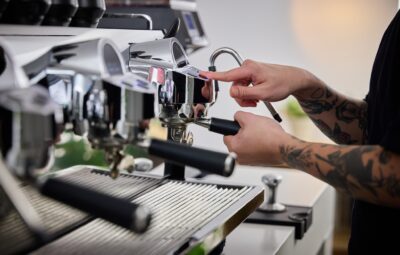Choosing the best commercial espresso machine involves considering various factors that affect performance, consistency, durability, and ease of use. Here’s what to look for:
1. Build Quality and Durability
Material: High-quality materials like stainless steel and brass are preferred for durability and heat retention. Machines with robust components are more likely to withstand the rigors of a commercial environment.
Reputation: Established brands with a history of producing reliable machines, such as La Marzocco, Synesso, or Conti, are often trusted by professionals.
2. Boiler System
Dual Boiler: A dual boiler system is ideal for commercial use. It allows you to brew espresso and steam milk simultaneously, improving efficiency and consistency.
PID Temperature Control: Machines with PID (Proportional-Integral-Derivative) controllers offer precise temperature control, which is crucial for consistently high-quality espresso extraction.
3. Pressure Control
Stable Pressure: Consistent and stable pressure is essential for proper extraction. The machine should be able to maintain 9 bars of pressure during the entire brewing process.
Pressure Profiling: Some advanced machines allow for pressure profiling, where the pressure can be adjusted throughout the extraction process to bring out different flavour profiles.
4. Capacity and Workflow Efficiency
Boiler Capacity: Larger boilers (or multiple boilers) are better suited for high-volume environments as they reduce recovery time between shots and steaming.
Multiple Group Heads: For busy cafes, machines with multiple group heads (2, 3, or even 4) allow for simultaneous brewing, increasing output and reducing wait times.
5. Ease of Use and Consistency
Automation: Features like volumetric dosing (where the machine automatically stops the extraction at a set volume) help maintain consistency across baristas. Fully automatic machines are also available, which automate most of the process, but at the cost of some control.
Programmability: Machines with programmable settings for temperature, shot timing, and pressure allow for fine-tuning to meet specific coffee profiles.
Intuitive Interface: User-friendly controls and clear displays are important for both novice and experienced baristas, reducing the learning curve and minimizing errors.
6. Steam Wand Performance
Powerful Steam Wand: A steam wand that can produce dry, powerful steam is essential for creating silky, microfoam milk for lattes and cappuccinos.
Manual vs. Automatic: Some machines offer automatic steam wands that stop at a pre-set temperature or foam level, which can be helpful in maintaining consistency.
7. Maintenance and Cleaning
Ease of Cleaning: Machines that are easy to disassemble and clean will save time and reduce downtime. Look for models with self-cleaning cycles or easily accessible parts.
Durability of Parts: Machines with readily available, durable parts are easier to maintain and service, minimizing long-term costs.
8. Energy Efficiency
Eco-Friendly Features: Machines with energy-saving modes, efficient boilers, and insulation can reduce energy consumption and operating costs, which is particularly important in high-volume settings.
9. Support and Warranty
Warranty: A strong warranty and reliable customer support are crucial for peace of mind, especially in a commercial environment where downtime can be costly.
Parts Availability: Ensure that spare parts are easily available and consider the availability of qualified technicians for repairs.
10. Aesthetic and Brand Image
Design: A visually appealing machine can enhance the ambiance of your café or restaurant. Some high-end machines are customizable to fit the aesthetic of the establishment.
Brand Perception: Certain brands carry a reputation for excellence and can even be a selling point for customers, contributing to your café’s brand image.
11. Cost
Budget Considerations: While high-end machines can be expensive, they are an investment. Balancing initial cost with long-term value, including durability and operational efficiency, is key.
12. Reviews and Recommendations
Industry Reviews: Check professional reviews and seek recommendations from other café owners or baristas to understand how different machines perform in real-world conditions.
Barista Preference: Involving your baristas in the decision can ensure that the machine meets their needs and preferences, leading to better coffee and smoother operation.
By focusing on these factors, you can choose a commercial espresso machine that delivers consistent, high-quality coffee, enhances workflow efficiency, and stands the test of time in a busy commercial environment.




